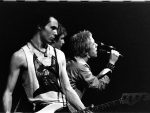The Sex Pistols Doomed 1978 Tour Through the U.S. South: Watch/Hear Concerts in Dallas, Memphis, Tulsa & More

The Sex Pistols “started out as an elaborate Situationist-inspired performance art piece dreamed up by megalomaniac manager Malcolm McLaren,” wrote Jonathan Crow in a post here at Open Culture about one of the band’s storied, disastrous final shows in Dallas of 1978. After beginning as the creation of McLaren and partner Vivienne Westwood, however, they “evolved beyond just being a stunt.”
The statement is objectively true by music history standards. The band’s earliest gigs were directly responsible for almost every major band that took British punk in subsequent post-punk, goth, new wave, dub, etc. directions, including the Buzzcocks, Siouxsie and the Banshees, The Clash, Joy Division, Wire, and too many others to list.
Later came the hugely influential post-punk of John Lydon's (formerly Rotten) own project, Public Image Limited, which reflected his serious interest in making experimental, cerebral, music with oblique lyrics deriving as much from symbolist poetry as the “deep simmering well of cultural discontent” he’d tapped into with the Pistols.
Lydon retired the character of Johnny Rotten when the band broke up at the end of their first and last U.S. tour, famously ending things at San Francisco’s Winterland Ballroom by sneering “ever get the feeling you’ve been cheated?”—a bitter comment on the band’s collapse, its very existence, and a press and audience willing to buy the act. No matter how influential they may have been, the Sex Pistols’ architects always maintained they were a cynical prank to the end.
The “one-time hippie haven of the Winterland in San Francisco,” as Ultimate Classic Rock describes it, may have been the perfect venue for their demise, a final screw you to the self-satisfied 60s rock culture Rotten loathed. But it was their tour through Atlanta, Memphis, San Antonio, Baton Rouge, Tulsa and the formerly Jack Ruby-owned Longhorn Ballroom in Dallas that made the most press, just as McLaren had designed it to do, booking country & western venues expressly to provoke, enrage, and scandalize.
Rotten had more complicated feelings about what would become a series of violent spectacles. He seemed half in on the joke, and half hoping that “real people” outside of coastal cities would become real fans. “We’re playing these cities because these are the people who will either accept us or hate us,” he said at the time. “They’re not as pretentious as they are in New York.”
He maintained in his autobiography that McLaren had also foreseen the U.S. tour as savvy marketing. “It wasn’t a question of throwing the band to the wolves when we chose to just play the South…. We felt that if we were ever going to be taken seriously in America, it would be from a base we built down south. The cowboys seemed to take it for the joke it was meant to be. We weren’t there to destroy their way of life or anything like that.”
Of course, he must have seen the U.S. press accuse the band of doing just that before their arrival—corrupting the youth, etc. Did he really hope for a warmer welcome from "the cowboys"? Was it all the glorious train wreck everyone thinks it was? Reports from eyewitnesses vary widely, as Altpress and The Dallas Morning News point out, with some expressing serious disappointment and others awe. Noel Monk’s book 12 Days on the Road describes “outrageous behavior, and concerts that frequently degenerated into near-riots.”
You can see for yourself what those unprecedented, at the time, shows looked and sounded like in the recordings here from the entire seven-city run. (Begun after a cancelled December 1977 gig in Pittsburgh). At the top we have “Anarchy in the U.K.” from the January 1978 tour opener in Atlanta; then audio of the entire show in Memphis days later; film from Randy’s Rodeo in San Antonio (in which Sid Vicious hits a fan with his bass); audio of the Baton Rouge concert; film of the entire performance at the Longhorn; film from Cain’s Ballroom in Tulsa, OK, with audio from the Winterland finale, and, finally, the Winterland itself.
After their flame-out in the first month of 1978, and Sid’s alleged murder of Nancy Spungeon and his overdose and death, John Lydon “claimed the Pistols had ‘killed’ rock and roll,” notes the site Randy’s Rodeo (named for the riotous Texas show further up). The whole tour “was a perverse, provocative joke.” McLaren’s “intent was not to sell tickets, but to incite controversy and mayhem.” The band, fractious, burned out, and eager to escape McLaren’s machinations, would have been more than happy to make some money for their trouble. Ever get the feeling you’ve been cheated?
Related Content:
The Sex Pistols Play in Dallas’ Longhorn Ballroom; Next Show Is Merle Haggard (1978)
Watch the Sex Pistols’ Very Last Concert (San Francisco, 1978)
Malcolm McLaren: The Quest for Authentic Creativity
Josh Jones is a writer and musician based in Durham, NC. Follow him at @jdmagness
The Sex Pistols Doomed 1978 Tour Through the U.S. South: Watch/Hear Concerts in Dallas, Memphis, Tulsa & More is a post from: Open Culture. Follow us on Facebook, Twitter, and Google Plus, or get our Daily Email. And don't miss our big collections of Free Online Courses, Free Online Movies, Free eBooks, Free Audio Books, Free Foreign Language Lessons, and MOOCs.
from Open Culture https://ift.tt/2l6UFvi
via Ilumina
Comments
Post a Comment